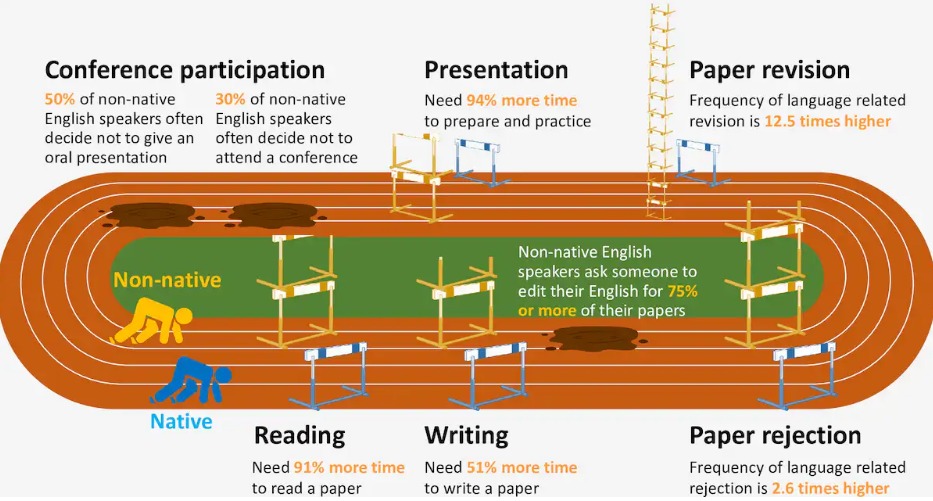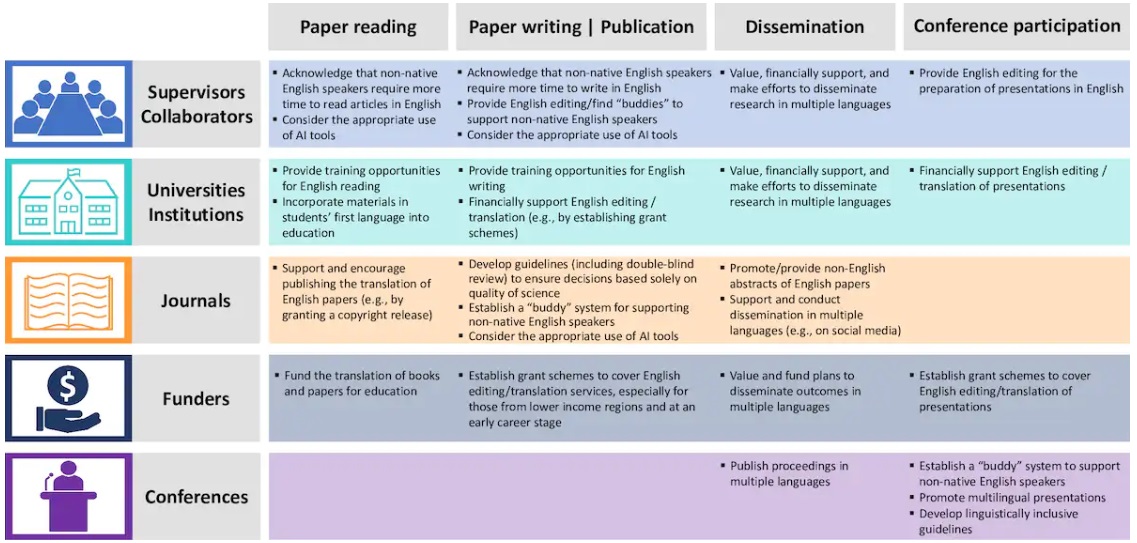[ad_1]
Today it’s essential to have a minimum of a primary degree of English proficiency in most analysis contexts. However on the similar time, our collective emphasis on English locations a big burden on scientists who converse a unique first language.
In analysis revealed right this moment in PLOS Biology, my colleagues and I reveal the enormity of the language barrier confronted by scientists who’re non-native English audio system.
English has develop into important in educational life
Scientists have to know English to extract information from others’ work, publish their findings, attend worldwide conferences, and collaborate with their friends from around the globe.
There’s little question this poses a big problem for non-native English audio system, who make up greater than 90% of the worldwide inhabitants.
But there’s a stunning lack of perception into how a lot additional effort non-native English audio system should make investments with the intention to survive and thrive of their fields.
Making these hurdles seen is step one in the direction of attaining honest participation for scientists whose first language isn’t English.
We launched the translatE challenge in 2019 with the intention of understanding the implications of language limitations in science.
We surveyed 908 environmental scientists from eight international locations – each native and non-native English audio system – and in contrast the quantity of effort the people required to finish totally different scientific milestones.
Large hurdles to leap
Think about you’re a non-native English-speaking PhD pupil. Based mostly on our findings, there are a number of main hurdles you’ll want to beat.
The primary hurdle is studying papers: a prerequisite for scientists.
In comparison with a fellow PhD pupil who occurs to be a local English speaker, you’ll want 91% extra time to learn a paper in English. This equates to a further three weeks per 12 months for studying the identical variety of papers.
The subsequent massive hurdle comes when making an attempt to publish your personal paper in English.
First, you’ll want 51% extra time to write down the paper. Then you definately’ll possible want somebody to proofread your textual content, similar to knowledgeable editor.
That’s for those who can afford them. In Colombia, for example, the price of these providers will be as much as half the typical month-to-month wage of a PhD pupil.
The unhealthy information doesn’t finish there. On common, your papers will nonetheless be rejected 2.6 instances extra usually by journals. If a paper isn’t rejected, you’ll be requested to revise it 12.5 instances extra usually than your native English-speaking counterparts.
Attending worldwide conferences is vital to creating your analysis community. However you would possibly hesitate to register since you “really feel uncomfortable and embarrassed talking in English”, as certainly one of our individuals informed us.
For those who do resolve to go and provides a presentation, you’ll want 94% extra time to arrange for it, in comparison with a native-English speaker.
And to remain in academia, you’ll want to beat all of those hurdles repeatedly.

Language limitations have a widespread affect
These hurdles result in appreciable disadvantages for non-native English audio system. Our research individuals expressed feeling “nice stress and nervousness”. They felt “incompetent and insecure”, at the same time as they made huge investments of money and time into their work.
We are able to think about how such experiences would possibly in the end drive individuals out of scientific careers at an early stage.
One significantly unhelpful and shortsighted view is that language limitations are “their drawback”. Actually, language limitations have vital penalties for scientific communities extra broadly, and for science itself.
Analysis has proven us that variety in science delivers innovation and affect. Scientific work carried out by non-native English audio system has been, and shall be, crucial to fixing world challenges similar to the biodiversity disaster.
If certainly, “a lot analysis stays unpublished as a consequence of language limitations” – as certainly one of our individuals stated – we may very well be lacking out on substantial scientific contributions from numerous clever minds.
What the scientific group can do
Traditionally, the scientific group has not often offered real assist for non-native English audio system. As a substitute, the duty of overcoming language limitations has been left to people’ personal efforts.
There are a variety of actions people, establishments, journals, funders and convention organisers can take to alter this.
As a primary step, journals might do extra to offer English enhancing assist to lecturers (as Evolution has began doing) and will settle for multilingual publications (because the preprint server EcoEvoRxiv does).
Convention organisers even have myriad alternatives to assist non-native English-speaking individuals. For instance, final 12 months’s Animal Behaviour Society convention integrated a multilingual buddy program to enhance inclusivity.

Synthetic intelligence (AI) might have a job to play, too. AI was broadly utilized by our survey individuals for English enhancing.
The British Ecological Society just lately built-in an AI language enhancing instrument into its journals’ submission system. Nonetheless, some journals have banned the use of such instruments.
We imagine it’s price exploring how the efficient and moral use of AI can assist break down language limitations, particularly since it could present free or inexpensive enhancing to those that want it.
It’s time to re-frame
I want English was my first language.
This remark by certainly one of our individuals underscores the best way non-native English audio system in science are sometimes seen by themselves and the entire group: by means of a deficit lens. The main focus is solely on what’s missing.
We should always, as an alternative, view these individuals by means of an asset lens. By transferring data throughout language limitations, non-native English audio system present numerous views that may’t in any other case be accessed. They’ve an indispensable function in contributing to humanity’s information base.
The scientific group urgently wants to deal with language limitations in order that future generations of non-native English audio system can proudly contribute to science. Solely then can all of us benefit from the full breadth of data generated throughout the globe.
This text was initially revealed in The Dialog on 18 July 2023. It may be accessed right here: https://theconversation.com/non-native-english-speaking-scientists-work-much-harder-just-to-keep-up-global-research-reveals-208750
In regards to the Creator
– Senior lecturer, The College of Queensland.
[ad_2]



 Tatsuya Amano
Tatsuya Amano